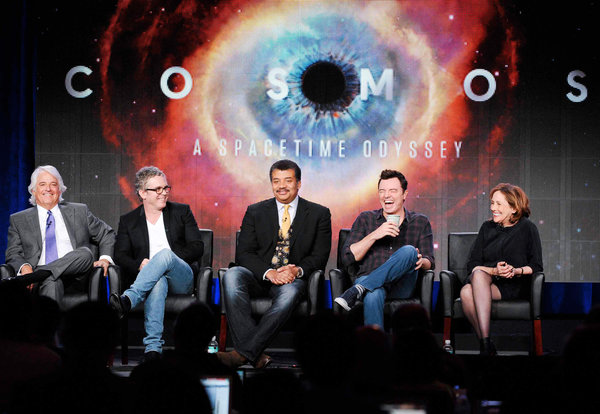Another week, another Cosmos episode, and another ridiculous creationist reaction.
This week the third Cosmos episode aired, focusing on the wonders of comets—such as Halley’s Comet, whose grand elliptical circumnavigation of the solar system parallels a human lifespan, as it did for Mark Twain—and the inevitable, glorious collision of our own galaxy with Andromeda. These are fascinating topics that can spark curious imaginations and make kids want to know more about science.

But this sense of wonder does not touch the hearts of those who reflexively dismiss scientific findings as merely “materialistic” threats to their faith. They have no interest in knowing more about Halley’s Comet, or Andromeda’s trajectory, or indeed even in stimulating young leaners.
No, creationists took to the air this week to complain that their ideas were not getting equal time on Cosmos.
Danny Faulkner, an astronomer with the creationist organization Answers in Genesis, appeared on The Janet Mefferd Show to complain that “consideration of special creation is definitely not open for discussion” on Cosmos. The host added,
“...when you have so many scientists who simply do not accept Darwinian evolution it seems to me that that might be something to throw in there, you know, the old, ‘some scientists say this, others disagree and think this,’ but that’s not even allowed.”
Actually, it is allowed. If creationist astronomers want to fund and produce a major television series that refutes Cosmos, they are perfectly free to do so.
But it wasn’t easy to green-light and develop the new Cosmos. America in 2014 is not the America of the past, when we had healthy pride and interest in space fueled by our manned space program. (Indeed, in our era of diminished vision, the manned space program has been abandoned, leading to the mirthless irony that the Russians won the space race after all, if judged by longevity.) American television audiences seem more interested in competitive singing than real science. While audiences breathlessly anticipate the latest offense to good taste from Miley Cyrus, viewership and readership of serious news plunges.
Re-imagining Cosmos in our current environment was therefore a hard sell. Even the entertainment chief of Fox, Kevin Reilly, described the show as “on the periphery of our brand.” But through the relentless efforts of its champion, Seth MacFarlane, the show was funded and produced, though it was “an unlikely effort for Fox or any of the broadcast networks, which rarely, if ever, broadcast continuing narrative documentary series in prime time anymore.”
So if creationists want a series to air their marginal views, they can bloody well pitch the idea to television executives and get it green-lighted, too. Who knows—maybe given the country’s religious demographics, executives might even see an opportunity to tap a potential audience.
It’s remarkable that so many creationists evangelize the virtues of the competitive “free market” except when it comes to what someone else creates, in which case they demand a “tax” of equal time. Expend your effort and risk your fortune to create a science show, and there’s a creationist with his hand in your pocket demanding his share.
This hypocrisy really should come as no surprise. While many creationists extoll the ability of random, undirected processes in economics to effect universal prosperity, they then turn around and argue random, undirected processes in nature cannot create very much at all. They think the invisible hand of the market works perfectly for economics, but the invisible hand of natural selection cannot work for evolution.
Halley’s Comet last graced our skies back in 1986. I saw the comet then, but I will probably not see it again. Likewise, the brief trajectory of Neil deGrasse Tyson’s Cosmos series may well prove to be a once in a generation event. Don’t miss it. Don’t miss Cosmos’s ephemeral, bright transit across our skies, its gravitational pull briefly holding back the gathering tide of ignorance and darkness.
UPDATE: Betty Phillips over at Think Progress has a great, very articulate piece on how Cosmos does focus on creationism--just not in the way creationists would like.
